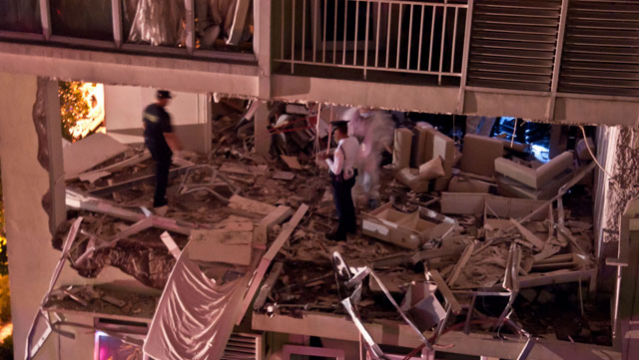SUMMARY
This is AI generated summarization, which may have errors. For context, always refer to the full article.
 No matter how brave I may pretend to be, the fear of death always lurks in the deep corners of my mind. It’s not necessarily the thought of dying itself that scares me, but dying incomplete or unfulfilled. Dying without having checked off my entire bucket list.
No matter how brave I may pretend to be, the fear of death always lurks in the deep corners of my mind. It’s not necessarily the thought of dying itself that scares me, but dying incomplete or unfulfilled. Dying without having checked off my entire bucket list.
The first time I saw death up-close and personal was during the Serendra blast one year ago. I was a newbie here in Manila and went to assist Rappler reporter Patricia Evangelista in covering the story. (READ: The coffin in the living room)
I would’ve never expected that in the Philippines’ swankiest district was where I’d see dead people for the first time. We arrived on the scene as they were hauling away the casualties who were smashed by a slab of concrete inside the Abensons delivery truck. (READ: TIMELINE: The 2013 Serendra blast).
One moment you’re driving on the street, and in an instant – you’re dead. Just like that. Chills ran down my spine when I saw the dead bodies.
Witnesses described hearing a loud bang and feeling a strong gust of wind when the explosion happened. But – surprisingly – it wasn’t long before people who had witnessed the explosion were back to normal.
When I got there, there was debris everywhere, broken glass and people standing behind police lines looking at the dead, who seemed more curious than concerned.
Then further down by Market! Market! was a more mindblowing scene: despite not being more than a few meters away from the mess, there were still parties going on, bands playing, and people dancing.
In the Philippines, in face of death, the music plays on.
I wasn’t sure if I was supposed to be angry, shocked, or if I just needed to understand that growing accustomed to the possibility of death was necessary to live without fear.
I couldn’t help but think, that could have been me. What promises have I left unfulfilled? What parts of the world have I yet to see?
I don’t think I’m alone when I say I’d rather not think about my mortality and the inevitable end of life for myself or the ones I love, but when something like that happens right in front of you, how could you not?
I realized we should think about it sometimes, because not a single person on this planet is excluded from this inevitable future. No one lives forever.

Out of that fear, and as family-oriented people, we do everything we can – even to the point of controlling our loved ones’ every move – sometimes way beyond their teenage years, to protect them from harm.
Many psychologists say that the decisions we make are heavily based on our fear of death. There are different levels of this fear, from the simple thought of it – to the extreme, like having an actual phobia of dying (called Thanatophobia).
On some level, community, societal actions, and government policies are (supposed to be) driven by what should be done to keep the greatest number of people with happy, healthy and living for a long time.
Our desire for a long life has also fueled innovation in science and medicine to allow human beings to live longer and healthier than ever before.
While being scared to live is unproductive, some fear is good. Consciously trying to avoid dying is also known as safety.
Before I leave my apartment every morning, I take a deep breath, look around the room, and thank the universe forthe chance to see another day, because the possibility that every moment may be the last is very real.
Working in the media here, it would be impossible to ignore the riding-in-tandem killings, journalist murders and weak judiciary that leave hundreds of these cases unresolved. Am I next? What about my friends and colleagues? (READ: PH 3rd worst country in unresolved media murders)
There are many hazards here that could claim anyone’s life at any moment: from a gas explosion, riding-in-tandem murder, or stray bullets from a shootout. And if that doesn’t kill you, you could be caught in a super typhoon, a flash flood, your town could be invaded by rebels or be hit by a devastating earthquake. If you manage to survive that, then you could get MERs, measles, and other airborne and waterborne diseases.
How unsettling is that?
And in my birth country – the United States – it is just as dangerous. According to crowdsourced data from news website Slate, at least 13,000 were killed by the gun in the US since the Newtown massacre in Connecticut in 2012, to the end of 2013. But even Slate admits the number could only be less than half of the actual total deaths by guns.
What’s more unnerving than losing your own life is the mere thought that something bad could happen to someone you love – and there is nothing you can do about it.
A time will come when you can no longer protect your loved ones. Part of that growing is accepting that – but having the strength and clarity to make the best decisions with what is in your control.
We live in dangerous times, but death cannot be a reason to stop living. What’s the use of living to be 100 when you live each day afraid to die?
Filipinos seem to accept death better than most. It could be from how accustomed society has grown to it, but I think it stems from a firm (religious) belief that the soul outlives the body beyond the physical world.
I eventually came to terms with my own mortality, but not because of God. One day that fear turned into inspiration (pardon the sermon). The inspiration to do something more meaningful than fulfilling my own personal wants. To live truthfully and do something that will touch, inspire or hopefully help the lives of other people. Once you do, there is nothing more to fear.
And it’s not who you dated, the clothes you wore, or even your career that people will remember. It’s the good things you did for others and – as Maya Angelou once said – “how you made someone feel.” And that is what will live far beyond our short time on earth.
I guess in some way, we do live forever. – Rappler.com
Ryan Macasero is a coffee obsessed, sleep-deprived (but happy) 20-something social media producer and the editor of Rappler’s #BalikBayan. He was a freelance journalist in the San Francisco Bay Area before making the crazy move to Manila in 2013. Follow him on Twitter: @ryanmacasero
Add a comment
How does this make you feel?
There are no comments yet. Add your comment to start the conversation.